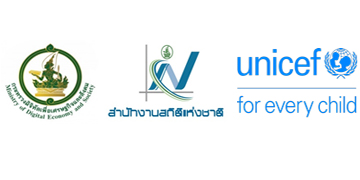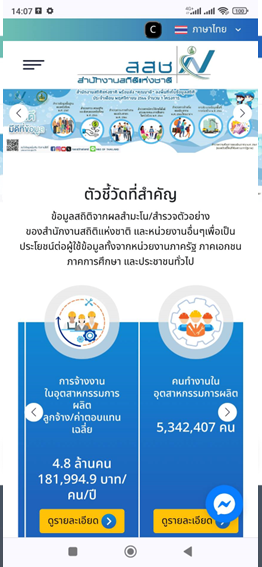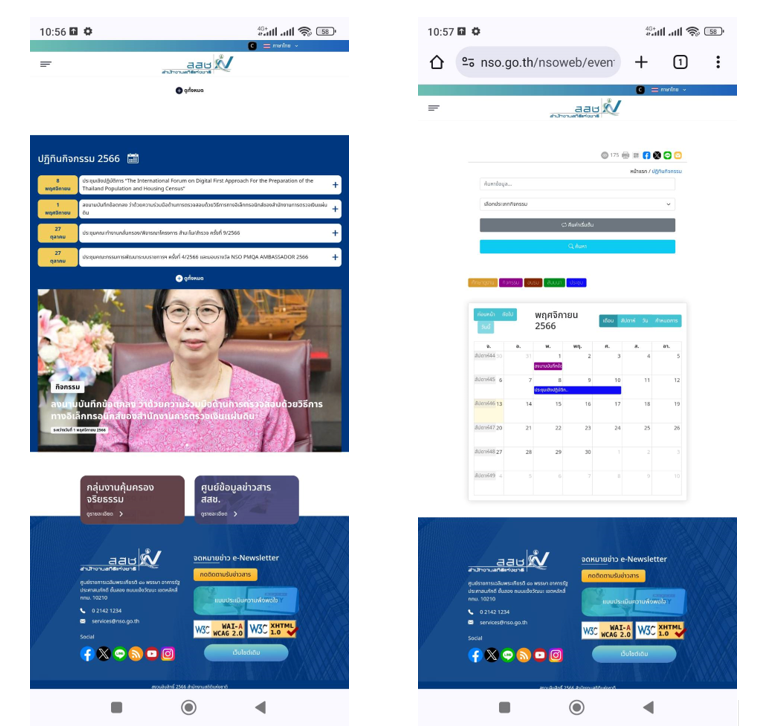ข่าวกิจกรรม/ประชาสัมพันธ์
Children from poor families and in remote communities are being left behind in Thailand’s development, new survey shows
 27 มีนาคม 2560
จำนวนคนเข้าชม 509
27 มีนาคม 2560
จำนวนคนเข้าชม 509

Children from poor families and in remote communities are being left behind in Thailand’s development, new survey shows
PRESS RELEASE
Children from poor families and in remote communities are being left behind in Thailand’s development, new survey shows BANGKOK, 27 March 2017 – A major national survey on the situation of children and women in Thailand, released today by the National Statistical Office (NSO) and UNICEF, shows how children and young people living in remote areas, children from poor households, and children whose parents have low-levels of education are lagging behind in health, education, and overall development.Conducted by the NSO with the support of UNICEF, the fifth Multiple Indicator Cluster Survey for Thailand, or MICS 5, collected data on health, development and protection of children and women in over 28,000 households across Thailand from November 2015 to March 2016. Despite many challenges, the survey also highlights many of Thailand’s progress for children and women such as in birth registration (99 per cent), accessing clean drinking water and sanitation (98 per cent) and primary school attendance (95 per cent). Yet, disparities remains. The survey found that one in ten children younger than five years of age in Thailand are stunted or too short for their age, but the rate is significantly higher among children whose mother has had no education, at 16 per cent. It also noted that male children, children living in the south and children in the poorest households are more likely to be malnourished than other children. “Thailand’s progress for children in recent decades has been truly impressive. At the same time, this survey confirms a significant difference in the well-being of children depending on where they live, their ethnicity, their household income and their mother’s education level,” said Thomas Davin, UNICEF Representative for Thailand. “Inequality must be seriously addressed now. And we believe that Thailand can do this.” Naunapa Thanasak, Acting Director General of the National Statistical Office presented some of the key findings during the press conference organized in Bangkok today. These include: While books are crucial for child stimulation and development, only 41 per cent of children under five years old in Thailand live in households with at least three children’s books at home. The rate drops to just 23 per cent in the poorest households, compared with the richest households of 73 per cent. Only 1 in 3 fathers in Thailand engaged in four or more activities that promote learning and school readiness. The rate is even lower among fathers from poorest household (1in 4) compared with the richest households (52 per cent). The level of mother’s education is heavily correlated with negative outcomes for children in health, development and education. For example, 24 per cent of children whose mother has no education are out of school, compared with just 0.4 per cent of children whose mother has higher education. The rate, however, is highest among nonThai children (34 per cent).Across the country, the birth rate for women aged 15-19 years is 51 births per 1,000 women. The north records the highest rate compared with other regions (72 births per1,000 women). Adolescent birth rate is also higher among girls from poor household (82 births per 1,000 women) and girls who have only primary education (104 births per 1,000 women), compared with girls from richest households (12 births per 1,000 women) and with higher education (3 births per 1,000 women). About 1 in 5 children age up to 17 years in Thailand or around 3 million children are living with neither parents although both are still alive. The proportion is highest in the northeast and among children from the poorest households (1 in 3 children not living with parents).“Children in rural areas and in poor families are facing the toughest journey growing up. Itshould not be this way. Every child deserves a fair chance in life. UNICEF is committed to working with partners to strengthen social services and social protection system that promotes equal opportunity for every child in Thailand.” Davin added. Dr. Pichet Durongkaveroj, Minister of Digital Economy and Society said the ministry aims to use technology to promote the quality of life, generate more income and reduce disparities. Through construction of a national broadband network, internet will be available to 24,700 villages across Thailand by the end of this year, and 2,000 digital centres will be established in local communities to promote e-commerce. “We are also working with Ministry of Public Health on the e-health village project which will connect citizens with health service providers. This will help ensure that all citizens including children and women have equal opportunity to access quality healthcare.” Pichet said. The survey also provides data on a range of other critical issues such as breastfeeding, school attendance, parenting and child discipline and knowledge and attitudes on HIV/AIDS.Download full report, key finding reports and the “Every Child Counts” brochure, go to
https://www.unicef.org/thailand/resources_356.html
For more information, please contact:
Nattha Keenapan, UNICEF Thailand, 086 616 7555 or [email protected]


 เข้าสู่ระบบ
เข้าสู่ระบบ
 0
0





 หรือ
หรือ 



